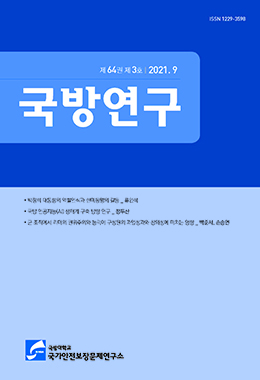본 연구는 한국형 무인전투기 개발에 앞서 명확한 운용개념의 정립이 필요하다는 문제의식에서 출발한다. 무인전투기 개발에 대한 국가 차원의 관심이 고조되고 있음에도, 해당 무기체계의 ‘운용개념’에 대한 검토수준이 상대적으로 미흡하기 때문이다. 이를 위해 그간 복합적인 의미로 활용되어 왔던 운용개념을 ‘작전운용개념’과 ‘체계운용개념’으로 세분화하고, 각각의 구성요소를 식별하였다. 이후 ‘작전운용개념’을 중심으로 한국형 무인전투기의 운용개념을 기술하였다.
본 연구에서는 ‘작전운용개념’의 핵심이 세부 임무식별과 그 우선순위 선정에 있다는 판단하에 다음의 두 가지 주장을 제시하였다. 첫째, 한국형 무인전투기의 임무는 ‘임무 위험도’와 ‘국제정치적 부담’, 그리고 현존 전력과의 ‘임무 중복성’의 문제를 고려하여 식별할 필요가 있다. 둘째, 무인전투기의 임무 우선순위 선정에 있어 ‘안보위협의 중대성’과 ‘기술 성숙도’의 조화가 중요하다. 이러한 기준에 근거할 경우 한국형 무인전투기는 북한에 대한 방공제압, 무장정찰, 그리고 공격협조정찰 임무에, 주변국의 경우 KADIZ를 경계로 한 대공방어 임무에 투입할 필요가 있다. 특히 본 연구에서는 북한 내 전략표적에 대한 무장정찰과 공격협조정찰 임무를 최우선순위에 두고 개발을 진행할 것을 제안하였다.
This study examines the ‘Concept of Operations’ of the ROK Unmanned Combat Ariel Vehicles(UAVs). Nevertheless of the increasing interests regarding Unmanned Combat System in ROK, the development of the UCAVs’ ‘Concept of Operations’ has been relatively insufficient. Therefore, for the systemic design of the UCAVs development plan(Roadmap), it is essential to clarify it’s meaning and elements that make up the realities of the Korean situation.
The purpose of this study is to present more specific and practical ‘Concept of Operations’ of the UCAVs for ROK national defense. For this purpose, this thesis seeks to analyze the meaning and elements of the ‘Concept of Operations’. Then, it examines the UCAVs’ ‘operational environments’, ‘purpose’, ‘missions’, and ‘mission priority’. This thesis concludes that, the ROK UCAVs’ should be operated for 4 missions- against the North Korea: SEAD, Armed Reconnaissance, SCAR/ KADIZ defense: Countersea- and the top priority should be put on the Armed Reconnaissance, SCAR against the strategic targets in the North Korea.




